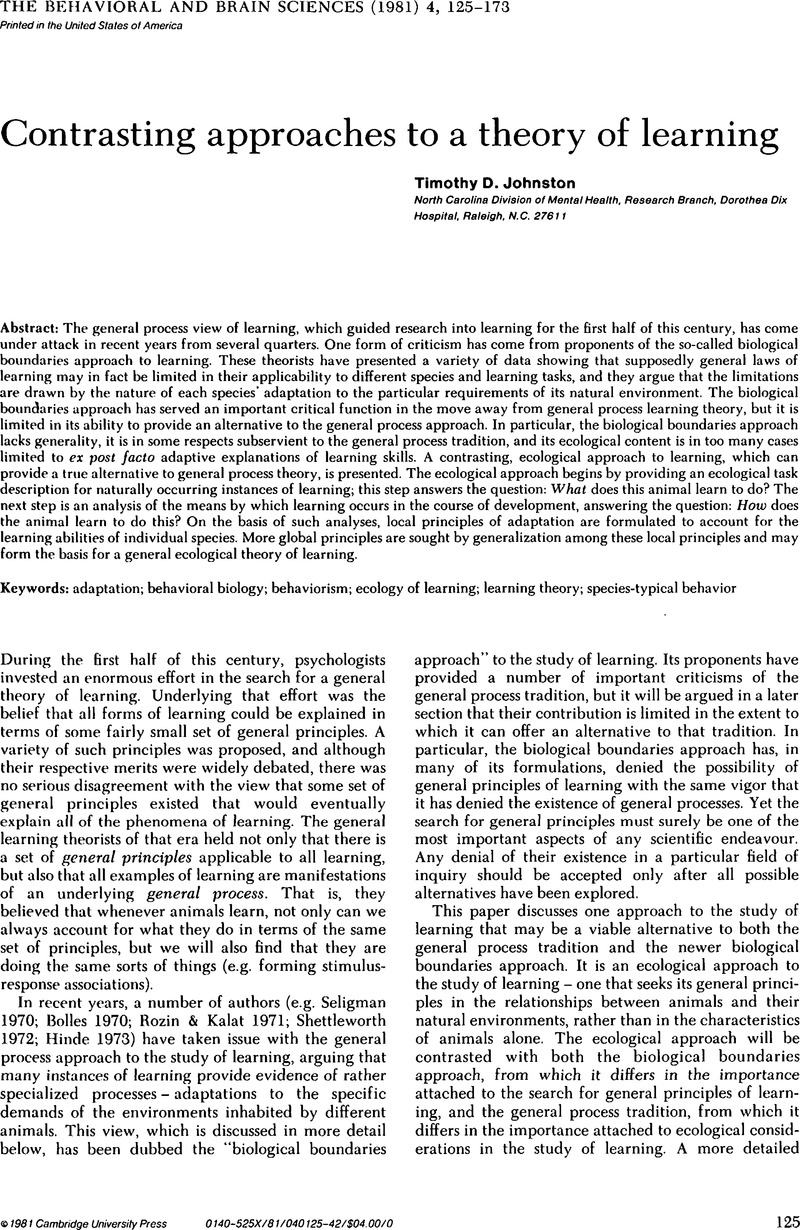Crossref Citations
This article has been cited by the following publications. This list is generated based on data provided by Crossref.
Kimmel, H. D.
1989.
The importance of classical conditioning.
Behavioral and Brain Sciences,
Vol. 12,
Issue. 1,
p.
148.
Kehoe, E. James
1989.
Associative theory versus classical conditioning: Their proper relationship.
Behavioral and Brain Sciences,
Vol. 12,
Issue. 1,
p.
147.
Locurto, Charles
1989.
The dark side of hegemony.
Behavioral and Brain Sciences,
Vol. 12,
Issue. 1,
p.
153.
Bersh, Philip J.
and
Whitehouse, Wayne G.
1989.
The domain of classical conditioning: Extensions to Pavlovian-operant interactions.
Behavioral and Brain Sciences,
Vol. 12,
Issue. 1,
p.
137.
Jacobs, W. J.
1989.
What is classical conditioning?.
Behavioral and Brain Sciences,
Vol. 12,
Issue. 1,
p.
146.
Fantino, Edmund
1989.
Response utility in classical and operant conditioning.
Behavioral and Brain Sciences,
Vol. 12,
Issue. 1,
p.
141.
Domjan, Michael
and
Nash, Susan
1989.
Conditioning of sexual and reproductive behavior: Extending the hegemony to the propagation of species.
Behavioral and Brain Sciences,
Vol. 12,
Issue. 1,
p.
138.
Lacey, Hugh
1989.
Classical conditioning beyond the laboratory.
Behavioral and Brain Sciences,
Vol. 12,
Issue. 1,
p.
152.
Turkkan, Jaylan Sheila
1989.
Classical conditioning: The new hegemony.
Behavioral and Brain Sciences,
Vol. 12,
Issue. 1,
p.
121.
Hollis, Karen L.
1989.
Preparatory response hypotheses: A muddle of causal and functional analyses.
Behavioral and Brain Sciences,
Vol. 12,
Issue. 1,
p.
145.
Smotherman, William P.
and
Robinson, Scott R.
1989.
The conditioned response: More than a knee-jerk in the ontogeny of behavior.
Behavioral and Brain Sciences,
Vol. 12,
Issue. 1,
p.
159.
Dworkin, Barry R.
1989.
Learning and functional utility.
Behavioral and Brain Sciences,
Vol. 12,
Issue. 1,
p.
139.
Moore, John W.
1989.
Cerebro-cerebellar learning loops and language skills.
Behavioral and Brain Sciences,
Vol. 12,
Issue. 1,
p.
156.
Samar, Vincent J.
and
Berent, Gerald P.
1989.
Classical conditioning and language: The old hegemony.
Behavioral and Brain Sciences,
Vol. 12,
Issue. 1,
p.
158.
Gardner, Beatrix T.
and
Gardner, R. Allen
1989.
Beyond Pavlovian classical conditioning.
Behavioral and Brain Sciences,
Vol. 12,
Issue. 1,
p.
143.
Turkkan, Jaylan Sheila
1989.
Classical conditioning beyond the reflex: An uneasy rebirth.
Behavioral and Brain Sciences,
Vol. 12,
Issue. 1,
p.
161.
Westland, James Christopher
and
Kochen, Manfred
1989.
Classical conditioning: A manifestation of Bayesian neural learning.
Behavioral and Brain Sciences,
Vol. 12,
Issue. 1,
p.
160.
Klosterhalfen, Wolfgang
1989.
A promising new strategy for studying conditioned Immunomodulation.
Behavioral and Brain Sciences,
Vol. 12,
Issue. 1,
p.
150.
Kentridge, R. W.
1989.
Complexity at the organismic and neuronal levels.
Behavioral and Brain Sciences,
Vol. 12,
Issue. 1,
p.
147.
Furedy, John J.
1989.
Flights of teleological fancy about classical conditioning do not produce valid science or useful technology.
Behavioral and Brain Sciences,
Vol. 12,
Issue. 1,
p.
142.



